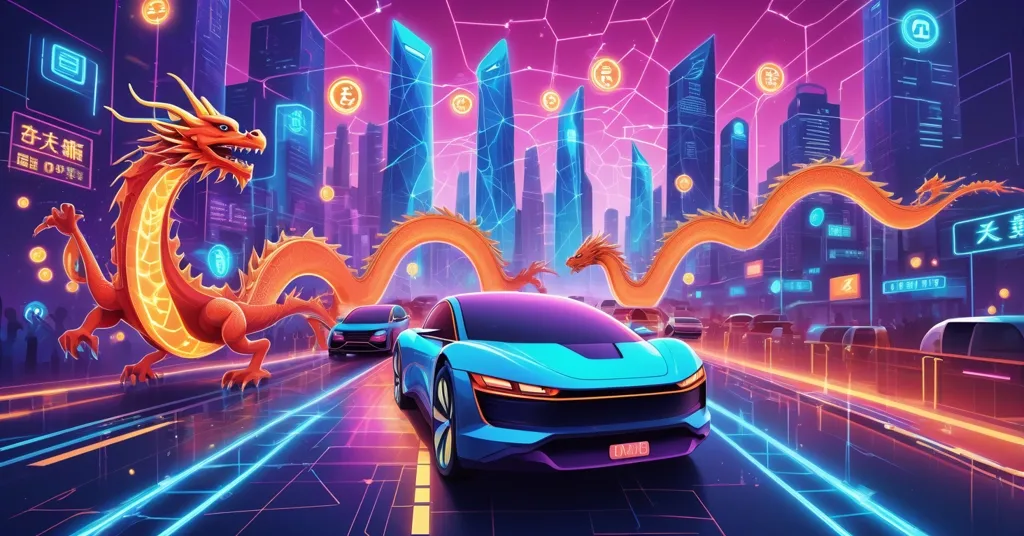China’s EV Surge: A Disruption as Bold as Bitcoin’s Financial Revolution

China’s Electric Vehicle Boom: A Disruption Rivaling Bitcoin’s Challenge to Finance
China’s electric vehicle (EV) industry is tearing through the global auto market with a ferocity that’s got legacy giants like Ford and Toyota sweating bullets. With unbeatable tech, dirt-cheap prices, and a stranglehold on production, Chinese brands are not just competing—they’re torching the old playbook. This seismic shift, felt from Melbourne to Detroit, echoes the kind of disruption Bitcoin and blockchain brought to finance, raising tantalizing questions about decentralization, privacy, and raw innovation in the face of centralized power.
- Global Dominance: China produces 70% of the world’s EVs and is set to claim 67% of global sales by 2025.
- Market Upheaval: Affordable, high-quality Chinese EVs are storming markets like Australia, targeting a 50% share by 2030.
- Tech Superiority: Seamless integration with Huawei and Xiaomi outpaces Western brands, mirroring blockchain’s efficiency.
China’s EV Juggernaut: A Centralized Titan
The stats are jaw-dropping. Ford CEO Jim Farley didn’t hold back when he called China’s EV market “the most humbling thing I have ever seen.” With 70% of all electric vehicles worldwide coming out of Chinese factories, their lead isn’t just about sheer numbers—it’s about cutting-edge innovation. Farley marveled at their tech, noting partnerships with tech giants like Huawei and Xiaomi create an experience where “your whole digital life is mirrored. No pairing. It just works.” Meanwhile, Western automakers are stuck in the mud, unable to forge similar alliances with companies like Apple or Google due to bureaucratic inertia or mismatched priorities. Farley’s warning to his own industry was chilling: “Their cost, their quality of vehicles is far superior to what I see in the West. We are in a global competition with China, and it’s not just EVs. If we lose this, we do not have a future Ford.”
“Seventy percent of all EVs in the world are made in China. They have far superior in-vehicle technology. Huawei and Xiaomi are in every car. You get in, and your whole digital life is mirrored. No pairing. It just works.” — Jim Farley, Ford CEO, at the Aspen Ideas Festival 2024
China’s dominance stems from a decade of heavy government subsidies, massive investments in battery tech through companies like CATL, and a relentless focus on scale. They’re not just building cars; they control the supply chain, particularly rare-earth materials—critical minerals used in EV batteries and high-power magnets that give vehicles their efficiency and zip. This grip adds a geopolitical edge, with export restrictions often wielded as retaliation against U.S. tariffs, leaving Western manufacturers in a bind. It’s a stark reminder of centralized power, much like the early days of Bitcoin mining when China held sway over the network before the 2021 ban. For deeper insights into this control, check out this overview of the Chinese EV industry’s rise.
Australia’s Market Shake-Up: Affordability Meets Quality
Down Under, the impact is impossible to ignore. Australia, long a stronghold for brands like Toyota, is getting hit by a tsunami of Chinese EVs. Projections suggest that by 2030, nearly 50% of new passenger car sales will be electric, a massive jump from just 7.8% at the end of 2024. What’s fueling this? Price and performance. Six of the top 10 best-selling EVs in Australia for 2025 are from Chinese makers like BYD, with models such as the Atto 3, Sealion 7, and Dolphin—priced at a steal of A$29,990 (around $20,000 USD)—flying off dealership lots. Xpeng’s G6 SUV at A$55,000 and Geely’s EX5 are also stealing the spotlight at events like the Melbourne International EV Autoshow. Riz Akhtar, founder of EV analytics firm Carloop, captured the shift perfectly: “We’re moving past the early-adopter phase to early-mainstream. The market is being turned on its head with these new brands entering.” For detailed sales data, take a look at this analysis of BYD, Xpeng, and Geely’s impact in Australia.
Even the luxury segment isn’t safe. Xiaomi, better known for smartphones, has stormed in with the YU7, a luxury SUV priced at just $35,000—undercutting Tesla’s Model Y, which starts at $36,760. The result? A mind-blowing 300,000 orders in mere days after its debut. Ray Evans, CEO of Future Drive AutoShows, summed it up: “We’ve gone through the tipping point.” This isn’t just a price war; it’s a ruthless takedown of Western automakers who’ve coasted on premium pricing while lagging in digital integration. Curious about how tech giants play a role? Explore this discussion on Huawei and Xiaomi’s integration into Chinese EVs.
Yet, there’s a snag. Brand perception remains a stubborn roadblock. Let’s be real: “Made in China” still gets sneered at as low-rent junk by many, and shaking that stigma is a brutal climb. Jason Clarke, CEO of TrueEV (Xpeng’s distributor in Australia), nailed the issue: “Brand perception is the hurdle. People still think Chinese equals cheap. That’s why we need people in the cars—experiencing them.” Hands-on exposure is gradually flipping opinions, but it’s a slow grind against decades of entrenched bias.
Western Automakers on the Ropes: Adapt or Die
Traditional giants are feeling the heat. Ford made a stunning pivot, shelving plans for electric SUVs in favor of hybrids—a move costing a hefty $2 billion. It’s like a gambler hedging at the crypto casino: cautious, but maybe just clever enough to win. Despite the massive write-off, Ford’s shares are up over 9% year-to-date, signaling investor confidence in Farley’s strategy to balance EV hype with consumer hesitation. Farley’s even floated licensing battery tech from China’s CATL, a humbling nod to the reality that the West can’t go it alone. Meanwhile, Tesla’s refreshed Model Y is clawing back market share in Australia, proving the old guard still has some fight left.
But the challenges run deeper. The West’s dependency on China for rare-earths mirrors crypto’s early reliance on centralized mining pools—a single point of failure that’s a geopolitical nightmare. Add in trade tensions, with U.S. tariffs and Chinese export curbs, and you’ve got a recipe for chaos. Could Western policy shifts, like subsidies for local EV production or new trade deals on critical minerals, slow China’s march? It’s not unthinkable, much like how regulatory crackdowns have reshaped crypto markets overnight. For a broader perspective on this upheaval, see how China’s EVs are disrupting the global car industry.
Blockchain’s Potential in EVs: A Decentralized Counterweight
China’s EV surge isn’t just a hardware revolution; it’s a glaring case of centralized might that begs for a decentralized response. This is where blockchain and crypto come in, offering tools to disrupt the disruptors. Imagine using blockchain for transparent, unchangeable records of where rare-earth materials come from—ensuring ethical sourcing without bowing to a single nation’s dominance. Projects like IBM’s blockchain supply chain initiatives already show how this tech can track goods with precision; adapting it to EVs could be the next frontier. For more on this concept, explore research into blockchain applications in EV supply chains.
Then there’s tokenized vehicle ownership, akin to holding Bitcoin as a digital asset. Turning a car’s title into a blockchain-based token could streamline transactions, cut out middlemen, and democratize access to financing—especially for affordable Chinese EVs flooding emerging markets. Smart contracts, self-executing agreements on platforms like Ethereum, could automate payments or leasing deals, slashing bureaucracy. And why not crypto payments for EV charging networks? Picture pulling up to a station, scanning a QR code, and paying with Bitcoin or a stablecoin—no banks, no fees, just pure efficiency. For related discussions on Bitcoin’s future alongside China’s influence, check out this Reddit thread on China’s EV disruption and Bitcoin.
This isn’t pie-in-the-sky dreaming. The ethos of effective accelerationism—pushing tech-driven progress, even if messy—fits here. Just as Bitcoin challenged fiat systems, blockchain could level the EV playing field by reducing reliance on centralized supply chains or data hubs. For Bitcoin maximalists, it’s a reminder: dominance in one sphere (like BTC in crypto) doesn’t negate the niches others fill. Ethereum and altcoins carve out unique roles, much like Chinese EVs target affordability and tech integration where Tesla or Ford stumble.
The Flip Side: Risks, Resistance, and Reality Checks
Let’s not get carried away with the hype. China’s EV boom has dark corners that’ll feel painfully familiar to anyone guarding their crypto wallets. The deep integration of Huawei and Xiaomi in dashboards raises massive privacy red flags. Who’s collecting your driving data, location history, or personal habits synced to the car? How secure is it? These are the same questions we ask about centralized crypto exchanges versus self-custody wallets. Without ironclad safeguards, “smart” cars could become surveillance machines on wheels. For further reading on these issues, delve into studies about privacy concerns in China’s EV industry.
Then there’s the environmental elephant in the room. EV battery production, much like Bitcoin mining, guzzles energy at an alarming rate. China leads in both arenas, but their renewable energy push often lags behind the demand. Studies suggest producing a single EV battery can emit as much CO2 as years of driving a gas car, paralleling the heat Bitcoin mining takes for its carbon footprint. Can sustainability keep up, or are we trading one eco-disaster for another?
Playing devil’s advocate, China’s lead isn’t a done deal. Tesla’s software updates and manufacturing muscle still pack a punch, while Ford’s hybrid bet might just bridge the gap for wary consumers. Western governments could throw curveballs too—think EU subsidies for local production or U.S. deals to source rare-earths elsewhere. BloombergNEF’s projection of 67% global EV sales for China by 2025 isn’t gospel; it hinges on volatile factors like policy shifts or consumer trust. Sound familiar? It’s the same uncertainty we mock in shameless crypto price predictions. Let’s not drink the Kool-Aid on EV dominance just yet. For the latest projections, you can verify the BloombergNEF report on China’s EV market share for 2025.
Key Takeaways and Burning Questions
- How is China dominating the EV market, and what can crypto learn from this?
China builds 70% of the world’s EVs and is poised to hold 67% of global sales by 2025, a centralized force that crypto’s decentralized tools—like blockchain supply chains or tokenized assets—could counterbalance. - What tech edges do Chinese EVs have, and how do they echo blockchain’s disruption?
Superior digital integration with Huawei and Xiaomi, plus rock-bottom prices, outstrip Western brands, much like blockchain’s efficiency upends traditional finance—though data privacy risks loom large in both. - How are markets like Australia being transformed by Chinese EVs, and where does crypto fit?
Brands like BYD and Xpeng are on track for 50% market share by 2030 with affordable models; crypto could slot in with payment systems for charging or smart contracts for financing. - What hurdles do Chinese EV brands face, similar to crypto’s adoption woes?
The “cheap” stigma lingers, mirroring crypto’s trust issues with mainstream audiences—direct experience is slowly changing minds for both. - Can Western automakers strike back, and what’s the takeaway for Bitcoin maximalists?
Ford’s hybrid pivot and Tesla’s rebounds show resilience, reminding Bitcoin purists that supremacy doesn’t erase the value of competitors filling gaps, whether in EVs or altcoins. - What privacy and environmental risks does China’s EV rise pose, akin to crypto concerns?
Embedded tech sparks data security fears like those over crypto wallets, while battery production’s energy drain rivals Bitcoin mining’s eco-criticism—sustainability is a shared weak spot.



